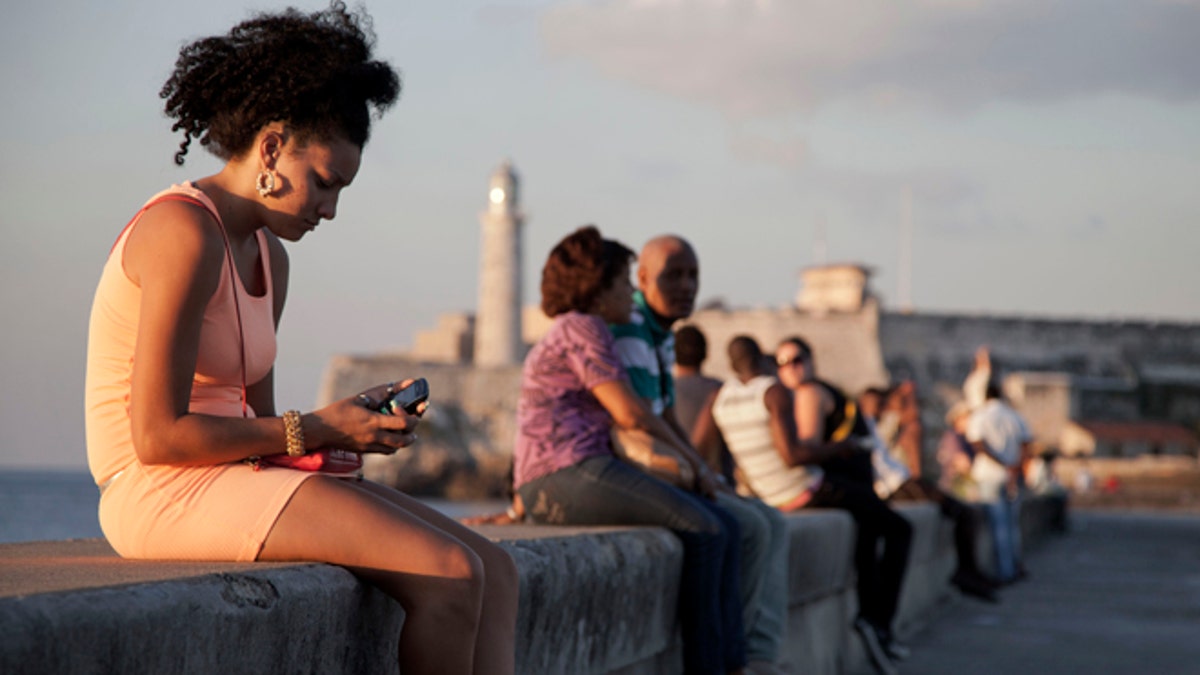
In this March 11, 2014 photo, a woman uses her cellphone as she sits on the Malecon in Havana, Cuba. The U.S. Agency for International Development masterminded the creation of a "Cuban Twitter," a communications network designed to undermine the communist government in Cuba, built with secret shell companies and financed through foreign banks, The Associated Press has learned. The project, which lasted more than two years and drew tens of thousands of subscribers, sought to evade Cubas stranglehold on the Internet with a primitive social media platform. (AP Photo/Franklin Reyes)
The U.S. government’s creation of a Twitter account aimed at undermining Cuba’s communist government by spurring people to dissent could end up doing just the opposite – empower the regime, said an expert on Cuba.
Ted Henken, a professor at the City University of New York, said a U.S. Agency for International Development (USAID) project that funded and helped create a “Cuban Twitter” through secret shell companies and foreign banks may serve as fodder for the Castro government to characterize the island’s cyber-dissidents as “mercenaries of the United States.”
“The most severe problem on the ground in Cuba” that would result from the news about the U.S.-created “Cuban Twitter” – first reported by The Associated Press – is “that it gives the Castro government cover to unleash a new wave of character assassination against authentic cyber-activists in Cuba,” Henken said.
Cuba’s dissidents in recent years have used social media to lift the veil of secrecy about the island’s human rights violations, and other problems, in real time.
While Cuba has long maintained a monopoly over media on the island, it has had decidedly more difficulty controlling the dissenting views by its residents on social media.
Some cyber-activists, like Yoani Sanchez, has gained international notoriety.
The “Cuban Twitter” project, which lasted more than two years and drew tens of thousands of subscribers, sought to evade Cuba's stranglehold on the Internet with a primitive social media platform. First, the network would build a Cuban audience, mostly young people; then, the plan was to push them toward dissent.
Yet its users were neither aware it was created by a U.S. agency with ties to the State Department, nor that American contractors were gathering personal data about them, in the hope that the information might be used someday for political purposes.
USAID Administrator Rajiv Shah said Thursday that it was not a covert program, though "parts of it were done discreetly" in order to protect the people involved. Shah said on MSNBC that a study by the U.S. Government Accountability Office found the project to be consistent with the law.
"This is simply not a covert effort in any regard," he said.
U.S. efforts to fuel discontent in Cuba, and even to assassinate Fidel Castro, are legendary. They include such James Bond-type tactics as using a cigar that was intended to blow up, and recruiting former lovers to poison Fidel Castro.
With the growing demand among younger Cubans on the island for access to technology, and in particular the Internet, Henken said, the U.S. government evidently saw an opportunity to tap into disillusionment over the communist regime by "using Twitter as a Trojan horse."
At minimum, details uncovered by the AP appear to muddy USAID longstanding claims that it does not conduct covert actions, and the details could undermine the agency's mission to deliver aid to the world's poor and vulnerable — an effort that requires the trust and cooperation of foreign governments.
The White House said the "Cuban Twitter" communications network was a "development" program and not a covert operation.
Spokesman Jay Carney said he is not aware of individuals in the White House who were aware of the program, but he also said President Barack Obama does support efforts to expand communications in Cuba.
The Associated Press contributed to this report.




